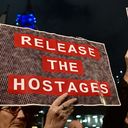Progress made in hostage talks after U.S. presents new proposal, sources say

U.S., Qatari and Egyptian officials presented a new more detailed framework for a hostage deal to Israeli negotiators during a key meeting in Paris on Friday, according to two sources with direct knowledge of the issue.
The big picture: The updated framework proposes that Hamas release roughly 40 hostages held in Gaza in exchange for a six-week ceasefire and the freeing of hundreds of Palestinian prisoners held by Israel, the sources said. It also would allow some Palestinians to begin returning to northern Gaza.
- The previous proposal also included a six-week ceasefire, but wasn't as detailed as the one presented on Friday.
- Biden administration officials say they want to try and get a deal before the start of Ramadan — a little over two weeks from now.
Behind the scenes: The two sources said there was progress made during the talks in Paris that could lead to more serious negotiations on an agreement in the next few days.
- A senior U.S. official echoed that, saying: "Some progress made in the hostage talks in Paris on Friday, but more ways to go to get a deal."
- A senior Israeli official said: "We are still far away from a deal but Hamas caved on some of its demands."
- Hamas has not publicly commented on any changes to its position.
The updated U.S.-proposed framework, per the sources, includes:
- The release of several hundred Palestinian prisoners in exchange for Hamas freeing 35 to 40 Israeli hostages, including civilian women, female soldiers, men over 50 and Israelis in serious medical condition.
- A stipulation that the number of Palestinian prisoners released for each of the female soldiers freed would be higher than that for the other abductees released during the first stage of the deal. The Palestinians released would also include prisoners convicted of killing Israelis and serving long sentences.
- Israel would agree to a day of ceasefire for each hostage released, meaning if Hamas releases the proposed number of abductees — 35 to 40 — for the first phase of a deal, there would be about six weeks of a pause in fighting.
The U.S. framework also includes an initial and limited return of Palestinian citizens to the northern part of the Gaza Strip that would start during the implementation of the first stage of the deal under conditions that would be defined during the detailed negotiations.
- It includes a significant increase in the scope of humanitarian aid that would enter the Gaza Strip.
- Like the previous proposal, the new framework only mentions general principles for the next phases of the deal that focus on the securing the release of soldiers and an exchange of bodies.
State of play: CIA director Bill Burns, Qatari Prime Minister Sheikh Mohammed bin Abdulrahman al-Thani and Abbas Kamel, the director of Egyptian intelligence, participated in the talks.
- The Israeli delegation, which included the director of Mossad, Shin Bet, and Israel Defense Forces intelligence, returned to Israel and will brief the war cabinet later Saturday or Sunday.
What they're saying: "We are working to get another framework for the release of our hostages, as well as the completion of the elimination of the Hamas battalions in Rafah," Israeli Prime Minister Benjamin Netanyahu said in a statement on Saturday.
- "Only a combination of military pressure and tough negotiations will lead to the release of our hostages, the elimination of Hamas and the achievement of all the war's objectives," he added.
What to watch: If the cabinet approves the new framework that the U.S. and the other mediators proposed, follow up meetings will take place in the coming days.
- A source with knowledge of the talks stressed that moving to detailed negotiations still depends on Qatari and Egyptian negotiators getting Hamas to agree to the new framework as well.
Netanyahu also said on Saturday that he will convene the security cabinet early next week "to approve the operational plans for an IDF operation in Rafah, including the evacuation of the civilian population from there."
- There's growing concern globally about a possible Israeli military operation in Rafah, where more than 1.4 million Palestinians — many displaced from elsewhere in Gaza — are currently concentrated.
Editor's note: This story has been updated with additional details.